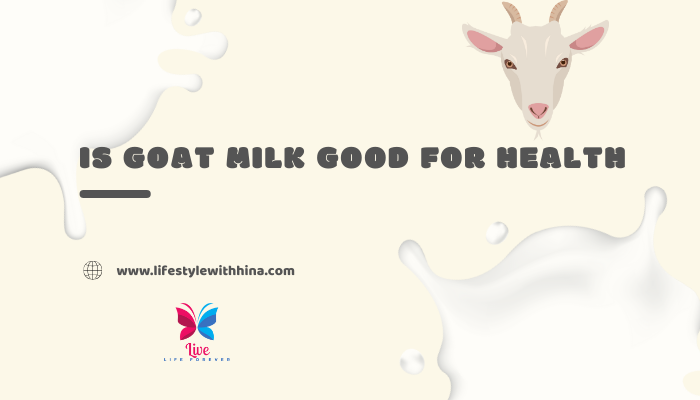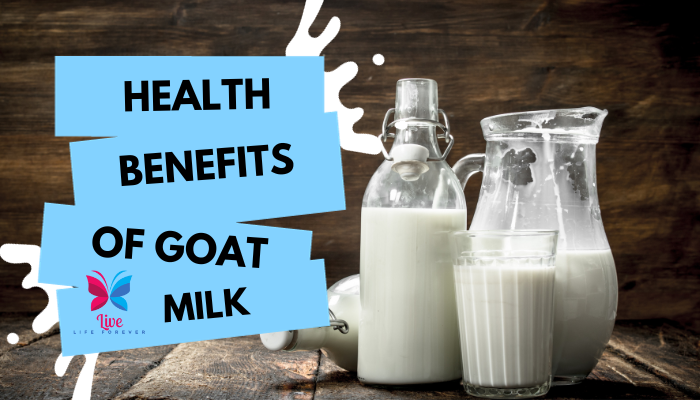Is Goat Milk Good For Health: Nature’s Multivitamin Drink

Is Goat Milk Good For Health: Nature’s Multivitamin Drink

Is Goat Milk Good For Health
Goat milk offers a nutritious, easily-digested alternative to traditional dairy. Despite being less popular than cow varieties, it packs tremendous nutritional value in a low-allergen package.
Delve into the unique composition of goat’s milk and how it impacts human health. Learn why it deserves a regular spot in diets as a nutrient-dense addition and Is Goat Milk Good For Health.
Discover how simple swaps support your gut, heart, immune system, and beyond! Let’s dive into the emerging science proving this farm favorite outperforms in many ways.
What Makes Goat Milk Special: Key Nutritional Differences from Cow
While rich and creamy like the traditional milk you know, the goat variety offers a signature nutritional profile. This alternative dairy diverges in key vitamins, minerals, and other compounds:
1. More Vitamins
Goat milk delivers extra vitamins. Per cup, it contains:
- 1.6x more calcium supporting bone density and heart function
- 25% more vitamin B2 promoting energy and skin health
- Nearly 3x more vitamin A bolstering immunity and vision
- 3-6x more potassium than cow’s milk benefiting blood pressure
The extra A and B2 directly aid growth and development in children.
2. Added Antioxidants
It also includes elevated levels of antioxidants that reduce cellular damage driving age-related disease:
- 2x more copper suppressing arthritis
- 1.5x higher selenium stores combatting cancer and thyroid issues
3. More Omegas
Goat dairy also packs a healthy omega punch! It has:
- 5x more medium chain fatty acids boosting metabolism
- 2x higher levels of linoleic acid regulating inflammation and blood clotting
4. Easier Absorption
The real game changer? The difference in fat molecules between goat and cow milk. Goat varieties contain smaller particles that digest easier.
This makes nutrients more bioavailable so your body readily absorbs the perks. The smaller size also reduces reactionary inflammation.
5. Fewer Allergens
Along this same vein, goat dairy is less allergenic, especially in children. The most common cow milk allergen, A1 casein protein, is almost absent in goat varieties.
This means less gastrointestinal upset, bloating, and other symptoms in the lactose intolerant. Its digestion evading properties even earned it the nickname “farmer’s Alka Seltzer”!
This unique nutritional profile translates into incredible advantages for human health…
The Top 5 Evidence-Based Health Benefits
With stellar nutrition stats and easy assimilation, goat milk delivers key wellness advantages:
1. It Strengthens Your Bones
The elevated calcium, phosphorus, and magnesium in goat milk promote bone building. These minerals deposit into the cellular matrix to reinforce your skeleton.
Alongside vitamin D, this combo reduces loss leading to osteoporosis over decades. It also cuts fracture incidence rates to protect longevity mobility.
The magnesium boost specifically calms muscle contractions preventing cramps. Drink up for comfort and durable bones!
2. It Supports Cardiovascular Health
Heart disease remains the number one killer of Americans. Luckily, research discovered goat milk delivers major benefits here too!
- It lowers blood pressure likely due to extra potassium easing tension and improving flow
- Raises “good” HDL cholesterol while lowering artery-clogging LDL particles in rodents
- Curbs inflammation driving atherosclerosis – plaque build up narrowing blood vessels
Pair your daily cup with magnesium and olive oil rich diets to optimize circulation!
3. It Bolsters Your Immune Defenses
That elevated vitamin A level also keeps illness away! This crucial nutrient maintains mucosal boundaries fighting infection across digestive, respiratory, urinary tracts.
Vitamin A even modulates genes regulating your protective T-cells and antibodies. Dip into goat dairy’s reserves to stay resilient.
4. It Eases Digestive Discomfort
Between eight and ten percent of Americans battle lactose intolerance. For these individuals, indigestible bovine dairy causes gas, bloating, and diarrhea.
However, the molecular structure of goat milk allows easy assimilation – even in the lactose intolerant! Its superior digestibility soothes common tummy troubles.
5. It Promotes Weight Loss
As mentioned earlier, goat milk holds more medium chain fatty acids. Your liver converts these directly into energy.
Research shows this boost in metabolism increases fat burning. Coupled with extra calcium curbing fat cell production and you’ve got a winning combo!
Further studies in diabetic and diet induced obese rat models found goat milk restricted inflammation, balanced blood sugar, lowered cholesterol, and controlled body weight. Quite the superdrink!
Of course, finding clear clinical data in humans still proves difficult. But the early findings shine with potential.
What does this mean in tangible terms? Goat milk offers a low calorie, nutrient-dense beverage packing protein for satiety along with metabolic enhancing fats. This seems the perfect recipe regulating overeating and unwanted pounds.
Give your waistline a boost by pouring it in your cereal, smoothies, or just drinking it straight!
Additional Goat Milk Benefits To Consider
Beyond these evidence-backed advantages, preliminary studies and anecdotal reports indicate other possible perks:
Neuroprotection: Goat milk raises essential choline levels which regulate nerves and brain signaling. Choline converted to acetylcholine aids learning, memory, muscles, metabolism, and liver function. This bioactive compound keeps your cognition sharp while delaying dementia.
Healing properties: Some credit it for easing psoriasis, eczema, acne, and digestive issues like ulcers or colitis flares. The creamy anti-inflammatory nourishment likely soothes irritation when other dairy proves problematic.
Bioavailability of medicines: Emerging evidence also suggests goat milk better enables absorption of essential medicines like folic acid supplements in the elderly and antiretrovirals in HIV positive individuals. This likely stems from its highly digestible platform shuttling pills efficiently through the gut.
Clearly goat’s milk nurtures human health via diverse mechanisms! But how much and what kind should you consume to cash in?
How Much Goat Milk Should You Drink Daily?
Moderate consumption provides benefits without overdoing calories or nutrients. Here’s a balanced breakdown:
1 cup (8 oz) daily offers a stellar nutritional boost while keeping fats reasonable. This hits 10% to 25% of daily needs for calcium, potassium, phosphorus along with hard to get micronutrients like selenium.
Too little limits advantages. Less than 4 oz wouldn’t deliver substantive value.
Too much overdoes calories – whole goat milk still packs high fat exceeding weight loss goals. It also contributes extra protein possibly stressing kidneys down the line in those vulnerable.
Customize your product: Skim or low fat varieties save calories while concentrating positives if you struggle with weight. Powdered mixes retain minerals absent calories if you dislike the flavor. Adding milk’s probiotic power to yogurt or kefir amps up friendly flora.
Pair with pre + probiotics to boost digestion, assimilation, and gut balance further. This covers any trouble fully absorbing its nutrients if sensitive.
Tailor your intake level and format to meet your individual needs while upholding the benefits!

Answering Common Concerns About Goat Milk
Despite the science supporting nutritional advantages, doubts still linger. Let’s clarify common misconceptions:
Is goat milk less nutritious than cow?
False! As described earlier, goat milk delivers extra key vitamins and minerals lacking in cow dairy. The better bioavailability also enables you to absorb more nourishment with less digestion strain.
Does it cause intestinal inflammation?
False! Goats produce the short chain A2 beta-casein protein rather than the A1 present in most cow dairy linked with immune issues. Their milk proves significantly less allergenic. Rare cases of goat milk sensitivity typically link with an allergy to caprine serum albumin – not casein.
Is raw goat milk safe?
Exercise caution. While heat treatment destroys some B vitamins and beneficial flora, it also neutralizes dangerous pathogens like Brucella or Listeria far more likely in raw dairy.
Pregnant women, young children, elderly, and anyone immunocompromised need to avoid raw milk outside controlled inspected facilities. However, for healthy adults, raw goat milk likely poses low risk and allows beneficial cultures to thrive such as coagulating kefir. Weigh your lifestyle factors and discuss options with your healthcare provider.
Does goat dairy get contaminated or spread disease?
Not if raised responsibly. Well cared for goat herds following modern hygienic principles remain very safe. Practicing prevention methods like foot baths, keeping udders clean during milking, rapid chilling after collection, and routine testing easily avoid issues. Look for licensed inspected farms.
In less economically developed regions, poor sanitation increases brucellosis exposure – this requires importing certified disease free animals. Luckily, stringent standards in Western nations keep goat products far safer.
Tips for Selecting and Enjoying Goat Milk
Convinced of the benefits yet unsure where to find it or how to incorporate more? Here are 5 simple suggestions:
1. Check Major Grocers
Thankfully, the merits of goat milk make it increasingly common. Brands like Meyenberg or Good Karma offer tasty UHT pasteurized varieties in stores like Target, Walmart, Kroger, Publix, and Whole Foods.REPLA
2. Seek Farmers Markets
Local dairies sell raw varieties alongside fresh produce. This allows purchasing directly from the source while supporting your community! Amish and other ethnically diverse sellers frequently offer goat options.
3. Use Online Suppliers
Home delivery from Amazon, Azure, US Wellness Meats and many more ensure freshness. Subscribing makes incorporating the habit seamless.
4. Add to Beverages
Stir it in coffee drinks or protein smoothies to make a satisfying, creamy treat! Non-dairy creamers won’t provide the same nutritional punch.
5. Swap in Cooking
Substitute water or milk in recipes to benefit savory dishes like soups, stews, oatmeal and sauces. Bake up some blueberry goat yogurt muffins or try goat cheese crusted chicken.
Not loving the taste? Start slow with small additions like lattes before graduating to full glasses. Added fruits, spices, or chocolate transform the flavor profile if you dislike plain varieties.
The Verdict: Should You Drink Goat Milk?
Beyond hydrating your day, beverages provide an easy venue to nourish your body in delicious ways. Goat milk checks all the boxes supplying a gambit of vitamins, minerals, antioxidants and metabolism enhancing fats with minimal allergy risk.
The diverse portfolio benefits your digestion, bones, heart health, weight, and even mental acuity! This farm fresh favorite out performs traditional cow dairy on multiple markers.
While more research still needs investigating mechanisms in humans specifically, early animal findings coupled with direct diet data makes a strong argument for incorporating modest amounts regularly.
Unless following strict vegan lifestyles, most healthy adults tolerate and benefit from responsible integrated goat milk. Pasteurized varieties ensure safety for vulnerable groups like children and elderly.
Avoid raw dairy unless inspected and deemed appropriate for your health status by your provider. Review sourcing if concerned about sanitation or contamination in developing areas. Luckily standards in Westernized countries keep risks exceptionally low while accessibility keeps improving.
Choose your product format based on needs – reduced fat and powders make great options controlling calories or boosting supplementation if overall healthy. Pair with pro and prebiotics to maximize advantages.
Sip your way to better bones, robust immunity, eased digestion, and enhanced nutrition status! Savor goat milk’s farm fresh wholesomeness as part of balanced diet and lifestyle approach to vitality at any age.




